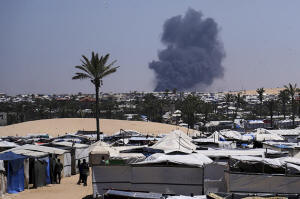Netanyahu promises new Gaza aid delivery plan as supplies still fail to
reach Palestinians
[May 22, 2025]
By WAFAA SHURAFA, SAMY MAGDY and MELANIE LIDMAN
DEIR AL-BALAH, Gaza Strip (AP) — The U.N. said Wednesday it was trying
to get the desperately needed aid that has entered Gaza this week into
the hands of Palestinians amid delays because of fears of looting and
Israeli military restrictions. Israeli strikes pounded the territory,
killing at least 86 people, according to Gaza’s Health Ministry.
Israeli Prime Minister Benjamin Netanyahu announced that the country is
days away from implementing a new aid system in Gaza that has come under
heavy international criticism. He said Israel later plans to create a
“sterile zone” there, free of Hamas, where the population, which has
repeatedly evacuated and relocated throughout the war, would be moved
and receive supplies.
With renewed ceasefire talks appearing to make little progress,
Netanyahu said he will end the war only if Hamas releases all hostages
and steps down from power — and if President Donald Trump’s plan to
relocate the territory's population outside Gaza is implemented. The
Palestinians, along with nearly all of the international community, have
rejected Trump’s plan to empty Gaza of its Palestinian population and
place the territory under U.S. control.
Under international pressure, Israel has allowed dozens of aid trucks
into Gaza after blocking all food, medicine, fuel and other material for
nearly three months. But the supplies have been sitting on the Gaza side
of the Kerem Shalom crossing with Israel.
U.N. spokesman Stephane Dujarric said the majority of supplies that had
entered since Monday had been loaded onto U.N. trucks, but they could
not take them out of the crossing area. He said the road the Israeli
military had given them permission to use was too unsafe.

A U.N. official later said more than a dozen trucks that left the
crossing area arrived at warehouses in central Gaza on Wednesday night.
The official spoke on condition of anonymity because they were not
authorized to talk to the press.
Israel said 100 trucks had crossed into Gaza on Wednesday.
Food security experts have warned that Gaza risks falling into famine
unless the blockade ends. Malnutrition and hunger have been mounting.
Aid groups ran out of food to distribute weeks ago, and most of the
population of around 2.3 million relies on communal kitchens whose
supplies are nearly depleted.
At a kitchen in Gaza City, a charity group distributed watery lentil
soup.
Somaia Abu Amsha scooped small portions for her family, saying they have
not had bread for over 10 days and she can’t afford rice or pasta.
“We don’t want anything other than that they end the war. We don’t want
charity kitchens. Even dogs wouldn’t eat this, let alone children,” she
said.
Aid groups say the small amount of aid that Israel has allowed is far
short of what is needed. About 600 trucks entered daily under the latest
ceasefire.
Netanyahu says population will be moved south
Israel has said its slight easing of the blockade is a bridge until the
new aid system it demands is put in place. The U.N. and other
humanitarian groups have rejected the system, saying it enables Israel
to use aid as a weapon and forcibly displace the population.
Netanyahu told reporters the plan will begin “in coming days.”
He said in a later phase, the “sterile zone” in southern Gaza would be
free of Hamas and the population would be moved there “for the purposes
of its safety.” There, they would receive aid, “and then they enter –
and they don’t necessarily go back.”
The plan involves small number of distribution hubs directed by a
private, U.S.-backed foundation known as the Gaza Humanitarian
Foundation. Armed private contractors would guard the distribution.
Israel says the system is needed because Hamas siphons off significant
amounts of aid. The U.N. denies that claim.
Initially, four hubs are being built, one in central Gaza and three at
the far southern end of the strip, where few people remain.
A GHF spokesman said the group would never participate in or support any
form of forced relocation of civilians. The spokesman, speaking on
condition of anonymity in accordance with the group’s rules. said there
was no limit to the number of sites and additional sites will open,
including in the north, within the next month.

[to top of second column]
|

Smoke rises from an Israeli army airstrike south of Khan Younis,
Gaza, Wednesday, May 21, 2025. (AP Photo/Abdel Kareem Hana)

Israeli warning shots shake diplomats
Israeli troops fired warning shots as a group of international
diplomats was visiting the Jenin refugee camp in the
Israeli-occupied West Bank. Footage showed a number of diplomats
giving media interviews as rapid shots ring out nearby, forcing them
to run for cover. No one was reported injured.
The Israeli military said their visit had been approved, but the
delegation “deviated from the approved route.” The military said it
apologized and will contact the countries involved in the visit.
The soldiers' actions were roundly criticized as officials from
Italy, Austria and Germany were among those demanding that Israel
investigate what happened. Foreign ministers in Canada and France
called for the Israeli ambassador to be summoned to provide an
explanation.
Israeli troops have raided Jenin dozens of times as part of a
crackdown across the West Bank. The fighting displaced tens of
thousands of Palestinians.
Early Thursday, sirens sounded across Israel as its military said it
intercepted a missile launched by Yemen’s Houthi rebels. The Houthis
did not immediately claim the attack, though it can take hours or
days for them to acknowledge their assaults.
The trickle of aid is jammed
Currently, after supplies enter at Kerem Shalom, aid workers are
required to unload them and reload them onto their own trucks for
distribution.
Antoine Renard, the World Food Program’s country chief for
Palestine, said 78 trucks were waiting. He told The Associated Press
that “we need to ensure that we will not be looted.”
Looting has plagued aid deliveries in the past, and at times of
desperation people have swarmed aid trucks, taking supplies.
A U.N. official and another humanitarian worker said the Israeli
military had designated a highly insecure route known to have
looters. The military also set a short window for trucks to come to
Kerem Shalom and rejected a number of individual truck drivers,
forcing last-minute replacements, they said. Both spoke on condition
of anonymity because they were not authorized to talk to the press.
COGAT, the Israeli defense body overseeing aid for Gaza, did not
immediately respond when asked for comment.

Hospitals surrounded
Israeli strikes continued across Gaza. In the southern city of Khan
Younis, where Israel recently ordered new evacuations pending an
expanded offensive, 24 people were killed, 14 from the same family.
A week-old infant was killed in central Gaza. In the evening, a
strike hit a house in Jabaliya in northern Gaza, killing two
children and their parents, according to hospital officials.
The Israeli military did not comment on the strikes. It says it
targets Hamas infrastructure and accuses Hamas militants of
operating from civilian areas.
Israeli troops also have surrounded two of northern Gaza’s last
functioning hospitals, preventing anyone from leaving or entering
the facilities, hospital staff and aid groups said this week.
The war in Gaza began when Hamas-led militants attacked southern
Israel, killing some 1,200 people, mostly civilians, and abducting
251 others. The militants are still holding 58 captives, around a
third believed to be alive, after most were returned in ceasefire
agreements or other deals.
Israel’s retaliatory offensive has destroyed large swaths of Gaza
and killed more than 53,000 Palestinians, mostly women and children,
according to Gaza’s Health Ministry, which doesn’t differentiate
between civilians and combatants in its count.
___
Magdy reported from Cairo and Lidman reported from Tel Aviv, Israel.
Associated Press writers Farnoush Amiri at the United Nations, Fatma
Khaled in Cairo, Sally Abou AlJoud in Beirut and Sam Mednick in Tel
Aviv, Israel, contributed to this report.
All contents © copyright 2025 Associated Press. All rights reserved |